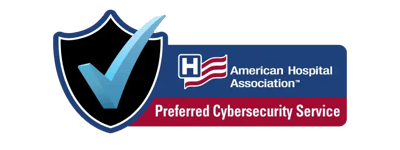Healthcare Organizations

We Know the Challenges You're Facing
Resource constraints
Small and midsize healthcare organizations have the same cyber-exposures and risks as major corporations, but you don't have corporation-size security budgets to protect your employees and patients.
Security coverage 24/7
Your IT and security team works hard but can’t focus on InfoSec around-the-clock. Today's attackers are creative, persistent, well-financed, and unfortunately focused on healthcare providers.
Compliance challenges
Healthcare systems need to comply with regulations covering patient privacy (HIPAA) and data security. Staying current with evolving compliance requirements is an ongoing challenge.
Ransomware attacks
Healthcare records contain sensitive personal information that makes them lucrative targets for ransomware attacks. Successful attacks can cripple hospital systems and put patient safety at risk.
Unsecured devices
Connected medical devices like MRI machines, infusion pumps, and heart monitors introduce security vulnerabilities which make device security and network segmentation critical to maintaining security.
Phishing scams
Healthcare workers are frequent targets of phishing emails and texts trying to trick them into revealing passwords and other sensitive info which means you need security awareness training for employees.
"With Critical Insight on our side, we know that we have similar security capability as much larger institutions and at a reasonable cost."
Andre Dixon
IT Director, Seattle Indian Health Board
“We needed a partner who could provide the right kind of coverage for our organization that had healthcare knowledge. Critical Insight did that for us.”
Nathan Wright
Director of IT, United Derm Partners
Why Critical Insight
We'll help you control your cybersecurity costs while integrating your other solutions to maximize your existing investments. As a member of the American Hospital Association, you'll get a member-only discount.
Our semi-annual healthcare breach reports and our exclusive partnership with CyberSaint compliance platform are unique to Critical Insight.
Deep Healthcare Security Expertise
Our founder, Fred Langston, helped write the original HIPAA Security Rule, making healthcare cybersecurity part of our DNA.
We produce a semi-annual healthcare breach report as part of our commitment to educating healthcare teams about the changes in Tactics, Techniques, and Procedures (TTPs) cybercriminals are using to attack and exploit healthcare computer systems and networks.
Services Designed to Ensure Compliance
Our services satisfy insurance and compliance requirements, including HIPAA, PCI, and state laws and our exclusive partnership with CyberSaint means you'll easily meet compliance standards while reducing cost and minimizing risk.
Mitigate even the most unprecedented risks while automating control compliance assessments at scale with patented AI and machine learning technology.
This governance, risk, and compliance engine is free when you buy Critical Insight MDR services.
We're Always There and Cost Efficient
Get the exact services you need to prepare for and detect attackers. As a cybersecurity-as-a-service provider, we are available around the clock.
You can trust we'll be there to respond to attacks, because breaches happen and you don't need to be worrying about your budget during a breach.

United Derm Partners
The challenge was to help operate multiple clinics with a small IT department delivering on many competing priorities. They needed a partner who could provide the right kind of coverage for our organization that had healthcare knowledge.

Seattle Indian Health Board
SIHB saved the cost of 2-3 security analysts and the expenses of internal tools and software. Rather than building out a SOC, the IT team is free to focus on supporting the health clinic, relieving a considerable burden on a small group.

5 Cyber Problems for Healthcare
Experts John Riggi (The American Hospital Association) and Drex DeFord (former CIO of Steward Healthcare, Seattle Children's, Scripps Health, USAD Health) explore five cybersecurity vulnerability areas that healthcare providers need to address.
